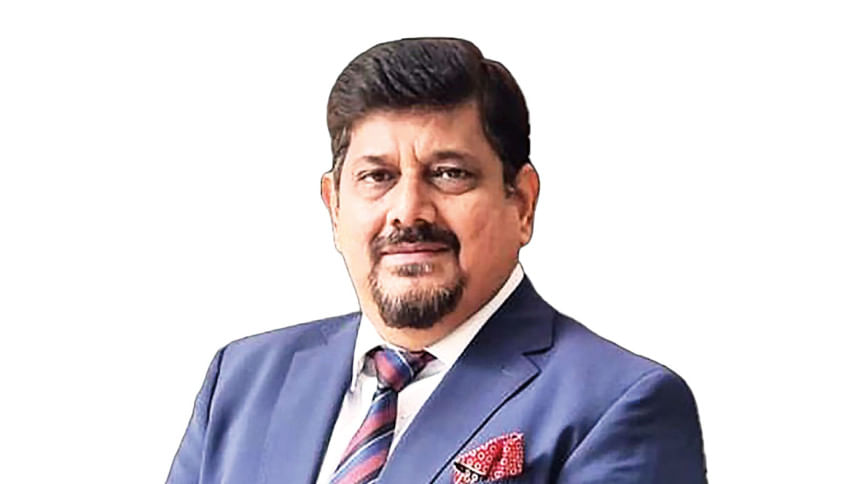Building growth aligned with environmental responsibility

Mohd. Rafat Ullah Khan
Managing Director (CC), Al-Arafah Islami Bank
The Daily Star (TDS): How would you assess the current state of sustainable banking in Bangladesh?
Mohd. Rafat Ullah Khan (MRUK): Bangladesh has made very good progress in sustainable and green banking. What once started as small steps has now become a national movement, supported by Bangladesh Bank along with the Government of Bangladesh. Together, they have created a system where banks play a big role in protecting nature while financing growth.
Today, banks are giving more attention to green, environment-friendly and sustainable projects in small businesses. This is a sign that sustainable banking is no longer just an idea — it is now becoming part of our financial culture.
At Al-Arafah Islami Bank, we are proud to be ahead in this journey. In 2024, our green finance share was 35.15 percent and sustainable finance was 35.60 percent — much higher than the national target set by Bangladesh Bank. This shows our strong commitment as well as the growing interest of our clients in eco-friendly projects.
TDS: What sustainable financing schemes does your bank currently offer, particularly for SMEs, women entrepreneurs, or other environmentally responsible enterprises?
MRUK: Our vision is clear: we want to support growth that leaves no harm on nature. To do this, we actively participate in several financing and refinancing schemes introduced by Bangladesh Bank. These include the Refinance Scheme for Green Projects and Initiatives, the Green Transformation Fund (in Taka, USD and Euro), and the Technological Development and Upgradation Fund.
What makes these initiatives truly effective is that they are simple and affordable. The investment rate is kept at just 5 percent, which encourages entrepreneurs to confidently step into sustainable ventures. We also give special priority to women entrepreneurs, because their participation is vital for creating a fair, strong, and eco-friendly economy.
TDS: What initiatives has your organisation taken to promote sustainable banking, and what measures have you introduced to reduce your own carbon footprint?
MRUK: Our offices are becoming more energy-efficient, digital banking reduces paper use, and everyday practices are being redesigned to lessen our footprint.
Externally, we prioritise green projects such as solar home systems, effluent treatment plants, environment-friendly brick manufacturing, recycling industries, organic farming, green buildings, and ICT-driven services. We have also invested in innovative instruments like Green Sukuk, showing our willingness to embrace new models of financing. Beyond financing, we organise capacity-building programmes and awareness campaigns to help clients and entrepreneurs see sustainability as a long-term strategy for success. Our CSR initiatives complement this by investing in health, education, and environmental conservation.
Internally, we take responsibility for our own footprint. Guided by our "Green Office Guide," we have adopted energy-efficient lighting, auto-sensor systems, eco-fonts for printing, e-mailing and paperless processes. We have introduced solar power in branches, encouraged online meetings and training, and shifted to full business process automation to minimise paper usage. Our digital banking transformation — through e-statements, mobile banking, and online services — not only improves customer convenience but also cuts down on discharges and waste.
TDS: What challenges has your bank faced in adopting and promoting sustainable banking practices?
MRUK: Rather than calling them challenges, we prefer to see them as opportunities for growth and leadership. Green projects often require modern technologies and significant upfront investment, but this opens the door for banks like ours to innovate, partner with global experts, and bring advanced solutions to Bangladesh's financial sector.
Awareness is another area where we are making steady progress. Many clients are still learning about the true potential of sustainable projects, and we see this as our responsibility to guide, educate, and build trust. This way, sustainability is no longer seen as a burden but as a new horizon of opportunity for entrepreneurs and businesses.
Most importantly, Bangladesh's own climate vulnerability gives our work greater urgency and purpose. We see it as a call to action. That is why we are committed to deepening our partnerships with regulators, government offices, and communities to create solutions that work for people and banking practices. For us, sustainable banking is not only a challenge but also an opportunity to lead with purpose, and we are proud to embrace it.
TDS: Looking ahead, what are your bank's future plans to advance sustainable banking, and what support do you expect from the government?
MRUK: Our vision is to advance with all related parties for a safer, greener, and more inclusive future. In the upcoming years, we will expand our investments in green and sustainable products, strengthen awareness and training programmes for both employees and clients, enhance governance for efficient resource use, and ensure the best utilisation of the Climate Risk Fund.
However, progress is always faster when the private sector and government move together. We believe the government's continued support will be key — particularly in areas such as tax holidays for energy-efficient capital machinery, subsidised financing for green initiatives, and a simplified certification process for identifying genuine green projects.

 For all latest news, follow The Daily Star's Google News channel.
For all latest news, follow The Daily Star's Google News channel. 



Comments